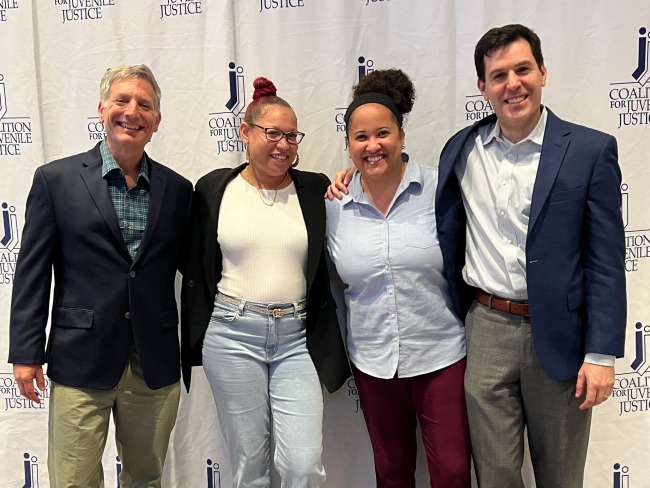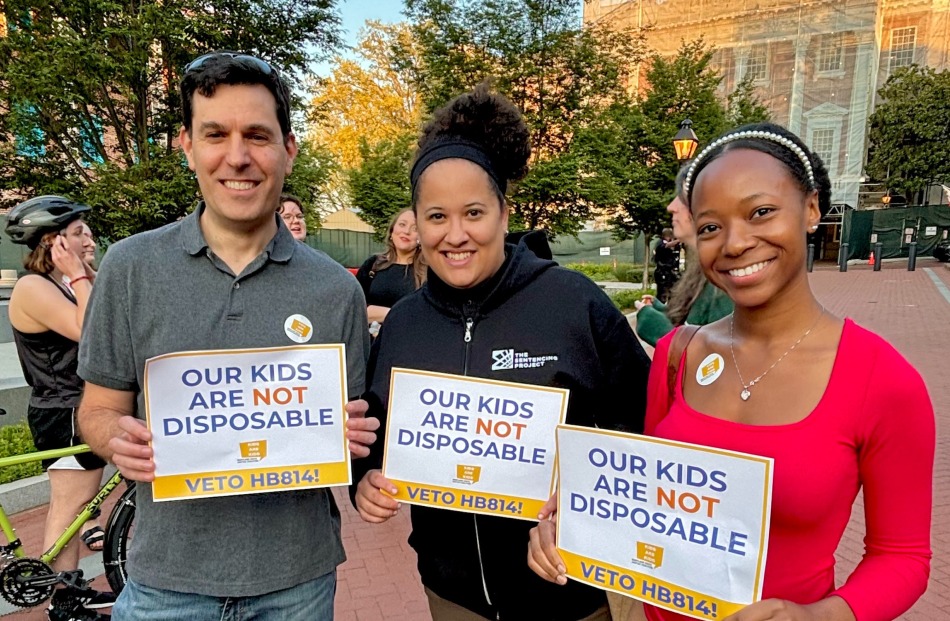Building Momentum for Reform
In 2024, we look forward to discussing best practices to protect community safety and boost youth success, and strategizing with our partners on ways to win in upcoming legislative sessions.
Related to: Youth Justice

 The Sentencing Project’s Youth Justice Team is excited to announce that Olivia Naugle has joined us as our new Campaign Strategist.
The Sentencing Project’s Youth Justice Team is excited to announce that Olivia Naugle has joined us as our new Campaign Strategist.
Olivia supports the Youth Justice Team’s advocacy efforts by managing a portfolio of state and federal policy issues such as the removal of youth from adult courts, jails, and prisons; expanded use of juvenile diversion; efforts to eliminate racial and ethnic disparities; and alternatives to incarceration for youth.
We are excited to have Olivia expand our capacity to push back against misleading information on youth crime, and to continue fighting for impactful reforms that protect public safety and enhance youth success.
Read more about our recent research and advocacy efforts below.
Research
This spring, we released a new resource page on the benefits of diverting youth from the juvenile justice system and tools to implement diversion programs across the country. The resource page features four new reports on diversion, along with profiles of directly-impacted youth who had the opportunity to participate in a local diversion program. We know youth do better and reoffend less when they’re diverted from the court system rather than prosecuted, and incarceration leads to worse public safety and youth development outcomes. (For a look at larger trends, we updated Youth Justice By the Numbers in August, showing this century’s 75% drop in youth incarceration.)
In May, we presented our findings at the large Coalition for Juvenile Justice annual conference which brings together practitioners and allies to discuss key issues. We also hosted two webinars “America’s Growing Movement to Divert Youth Out of the Justice System” and “Reducing Youth Incarceration: What Works?” that were well attended by advocates looking to implement diversion in their jurisdictions. We are excited to continue amplifying the many benefits of diverting young people away from the justice system and giving youth justice practitioners the tools needed to implement successful diversion programs.
Advocacy
Unfortunately, this year, many states considered proposals to roll back reforms and some actually brought those to fruition.
In Maryland, youth justice advocates faced pushback from lawmakers to roll back the Juvenile Justice Reform Act. As a result, HB 814 passed the legislature and went into law despite a large rally and other efforts from advocates. This legislation reverses some of the reforms passed just two years ago, and increases the number of offenses a 10- to 12-year-old can be charged with, expands detention eligibility, and extends lengths of probation for misdemeanors and most felonies. We submitted testimony to both the House and Senate judiciary committees, and will continue working with the Maryland Youth Justice Coalition to educate Marylanders about the harms of this bill. We know that young people have better safety outcomes when they remain in the juvenile justice system.

Louisiana, under Senate Bill 3, reversed its raise the age statute, adding Louisiana to the list of states (Wisconsin, Georgia and Texas) that start youth in the criminal legal system beginning at age 17.
In Wisconsin, we advocated for a raise the age bill that included removing children under 12 from juvenile courts. Unfortunately, the bill didn’t pass the legislature. Ahead of the next legislative session, we are working with partners to expand the voices of directly-impacted youth and families in our coalition, strategize on effective messaging, and support media training for our partners to educate lawmakers and the public on the importance of keeping kids in the youth system.
In North Carolina, the legislature passed HB 834, which will send more 17-year olds to adult courts. We sent Governor Roy Cooper a letter urging him to veto this harmful legislation. The governor listened to the community and vetoed the bill, but the legislature ultimately overrode the governor’s veto. We’re grateful for the advocates who worked tirelessly to fight this rollback and look forward to opportunities to advance youth justice in the future.
Over the fall, our team will continue working relentlessly with our partners to advance youth justice in their jurisdictions. We look forward to discussing best practices to protect community safety and boost youth success, and strategizing with our partners on ways to win in upcoming legislative sessions.


